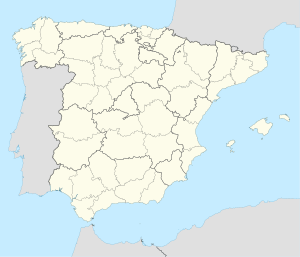| Battle of Lauron | |||||||
|---|---|---|---|---|---|---|---|
| Part of the Sertorian War | |||||||
| |||||||
| Belligerents | |||||||
| Sertorian rebels | Roman Senate | ||||||
| Commanders and leaders | |||||||
|
Quintus Sertorius Octavius Graecinus Gaius Tarquitius Priscus |
Pompey Magnus Decimus Laelius † | ||||||
| Strength | |||||||
|
c. 20,000–30,000 men[3][4] engaged: 12,000 men • 10 cohorts of heavy infantry • 10 cohorts of light infantry • 2,000 cavalry |
• 30,000 legionaries[4] • 1,000 cavalry[4] • unknown number of auxiliaries and allied troops engaged: 10,000+ men | ||||||
| Casualties and losses | |||||||
| Probably few | 10,000 (Livy)[5] | ||||||
Location within Spain | |||||||
The Battle of Lauron (also known as the Battle of Lauro, not to be confused for the Battle of Lauro of 45 BC) was fought in 76 BC by a rebel force under the command of the renegade Roman general Quintus Sertorius and an army of Roman Republic under the command of the Roman general Gnaeus Pompeius Magnus (better known as Pompey). The battle was part of the Sertorian War and ended in victory for Sertorius and his rebels. The battle was recorded in detail by Frontinus in his Stratagems and by Plutarch in his Lives of Sertorius and Pompey.[6]
- ^ Smith, William. "Dictionary of Greek and Roman Geography (1854)". Perseus Digital Library. Tufts University. Retrieved 2 November 2020.
- ^ Sampson 2013, pp. 182, 185–186, 187.
- ^ According to Orosius (5.23.9), Sertorius had 60,000 infantry and 8,000 cavalry at his disposal. Before Sertorius besieged Lauron, he sent M. Perpenna and a force of 20,000 infantry and 1,500 cavalry to reinforce Herennius in the territory of the Ilercavones, and another force of more than 20,000 men under L. Hirtuleius to keep Metellus penned up in his province.[2]
- ^ a b c John Leach, Pompey the Great, p. 44.
- ^ Frontinus, Stratagems, 2.5.31.
- ^ Frontinus, Stratagems, 2.5.31; Plutarch, Life of Pompey, 18.3; Plutarch, Life of Sertorius, 18; John Leach, Pompey the Great, pp 226-227; Philip Matyszak, Sertorius and the Struggle for Spain, pp 96-101.

